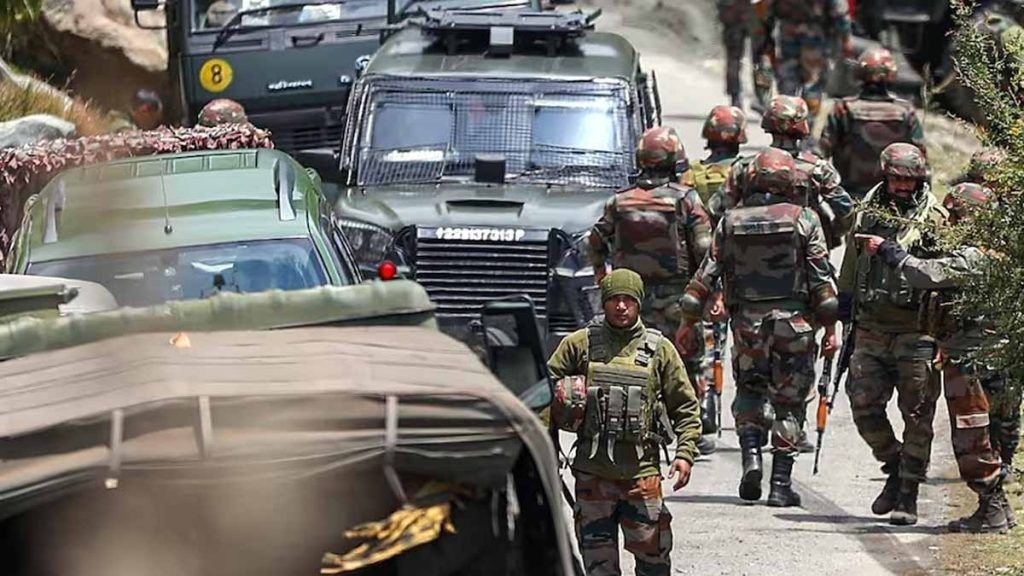The most tasteless response to the murder of three uniformed bravehearts by terrorists in J&K yesterday came from Farooq Abdullah: Terrorism “will continue until India talks to Pakistan”. His statement contains three false notions: India has invited terrorism, Pakistan has legitimate interests in J&K, and there is somebody in Pakistan whom India can talk with. The sacrifices of Manpreet Singh, Ashish Donchak and Himayun Bhat represent solid and honourable traditions of the uniformed forces that defend India. India will respond but hopes the world recognises the dangers of Pakistan’s deep state.
Pakistan has no legitimate claims on Kashmir anymore than it has on Hyderabad or Bhopal. But the Valley became the vessel for Pakistan’s anger at itself after the idea of Pakistan died at birth when most Muslims stayed back in India. And, it was buried with the creation of Bangladesh. Pakistan’s terror factory was born at a meeting in 1980 between General Zia-ul-Haq and Jamait-i-Islami’s (JEI) Maulana Abdul Bari in Rawalpindi. JEI was founded in 1941 by Maulana Syed Maududi, whose 1920s’ book Jihad in Islam advocated an Islamic state and detailed the vanguard revolutionary tactics that are used by terrorists today. Pakistan’s support of America’s covert war against Russia using mujahideen and ISI was a necessary calculation. General Zia responded to Maulana Bari’s hesitations by asking, “How can the Americans stop us from waging jihad in Kashmir when they are waging jihad in Afghanistan?” Zia suggested he would massively over-inflate the Afghanistan costs — reimbursed by the CIA and Saudis — and divert that surplus to Kashmir. Since 1990, Pakistan has exported over a lakh handguns/AK-47s to J&K, hurting 75,00 families in the region.
The most tasteless response to the murder of three uniformed bravehearts by terrorists in J&K yesterday came from Farooq Abdullah: Terrorism “will continue until India talks to Pakistan”. His statement contains three false notions: India has invited terrorism, Pakistan has legitimate interests in J&K, and there is somebody in Pakistan whom India can talk with. The sacrifices of Manpreet Singh, Ashish Donchak and Himayun Bhat represent solid and honourable traditions of the uniformed forces that defend India. India will respond but hopes the world recognises the dangers of Pakistan’s deep state.
Pakistan has no legitimate claims on Kashmir anymore than it has on Hyderabad or Bhopal. But the Valley became the vessel for Pakistan’s anger at itself after the idea of Pakistan died at birth when most Muslims stayed back in India. And, it was buried with the creation of Bangladesh. Pakistan’s terror factory was born at a meeting in 1980 between General Zia-ul-Haq and Jamait-i-Islami’s (JEI) Maulana Abdul Bari in Rawalpindi. JEI was founded in 1941 by Maulana Syed Maududi, whose 1920s’ book Jihad in Islam advocated an Islamic state and detailed the vanguard revolutionary tactics that are used by terrorists today. Pakistan’s support of America’s covert war against Russia using mujahideen and ISI was a necessary calculation. General Zia responded to Maulana Bari’s hesitations by asking, “How can the Americans stop us from waging jihad in Kashmir when they are waging jihad in Afghanistan?” Zia suggested he would massively over-inflate the Afghanistan costs — reimbursed by the CIA and Saudis — and divert that surplus to Kashmir. Since 1990, Pakistan has exported over a lakh handguns/AK-47s to J&K, hurting 75,00 families in the region.
Terrorism undermines the fundamental law of war by removing the distinction between combatants and noncombatants. Terrorist outfits like LeT, which kill innocent men, women and children, do not thrive in democracies. They have a totalitarian mindset that recognises no limits to power. Most Western countries — particularly America — believe that terrorism began with the 9/11 attacks. But in The Meadow: Kashmir, Where the Terror Began, Adrian Levy and Cathy Scott-Clark suggest that the kidnapping of six foreigners in 1995 was an early sign of Islamic terrorism expanding its targets beyond India to include Western countries and their citizens. They argue that the early terrorist career of Masood Azhar mirrored Osama Bin Laden’s writing. Levy and Scott-Clark write: “In the mountains of Kashmir that summer, Masood’s gunmen experimented with the tactics and rhetoric of Islamic terror, unveiling to the world extreme acts and justifications that were new at that time but that would soon become all too familiar”. They believed it was a short leap from these kidnappings to the suicidal assaults in New Delhi, Srinagar, New York, Washington, London and Mumbai that killed and injured thousands. In 2002, Masood’s bodyguard adopted tactics honed during the Kashmir kidnapping to abduct a Wall Street Journal reporter, Daniel Pearl, and filmed his horrific beheading. Terrorism knows no boundaries and rotates enemies.

